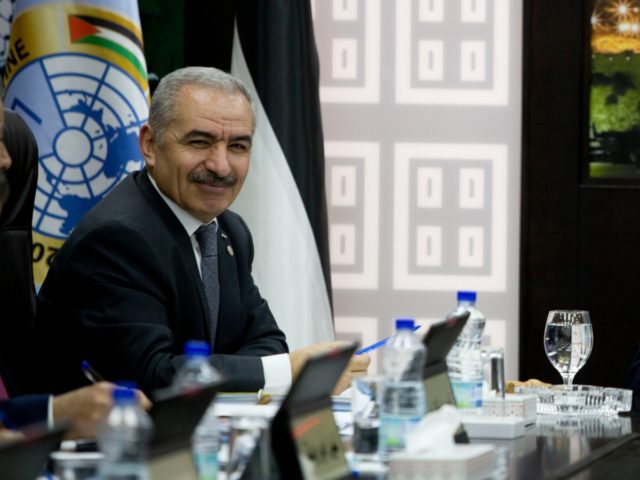TEL AVIV – The Palestinians will unilaterally declare a state based on the pre-1967 lines if Israel goes ahead with its plan to annex parts of the West Bank, Prime Minister Mohammed Shtayyeh warned Tuesday.
According to Shtayyeh, Israel’s plans to apply sovereignty to Jewish settlements in the West Bank and the Jordan Valley constituted an “existential threat” to the Palestinians and violates all Jerusalem’s agreements with Ramallah.
“We are facing the moment of truth: nowhere on earth can we live with this annexation,” he said. “If Israel goes to annexation, it is a different day for us… Annexation is an existential threat to our future.”
He called on the international community to sanction Israel if it went through with its move.
“Annexation is the erosion of a future Palestinian state,” he said, “and the world has to choose between international law and annexation. I am sure the international community will choose international law.”
Shtayyeh falsely claimed Israel has already taken small measures on the ground in the Jordan Valley in preparation for annexation, including sending utility bills to Arab residents and removing the signs saying, “Beyond this point is Palestinian.”
However, according to The Jerusalem Post, which cited Palestinians in the Jordan Valley, no signs have been removed or replaced. Israel has also billed Palestinian residents in the area for water and electricity for decades, the newspaper noted.
“Our immediate target is not to allow Israel to annex,” Shtayyeh said. “This is our immediate target – between today and July 1 all our efforts are focused on this point.”
According to the coalition deal between Prime Minister Benjamin Netanyahu and Alternate Prime Minister and Defense Minister Benny Gantz, annexation could be brought to a vote in the Knesset as early as July 1.
However, the U.S. has made it clear no unilateral moves to annex should happen before a mapping committee finishes mapping out the territory, something that could take many weeks or even months, according to the Times of Israel.
Shtayyeh said that such maps “endanger the whole future of the peace process.”
The Trump administration’s peace plan sees Israel annexing 30 percent of the West Bank and the Jordan Valley. It would also see a demilitarized Palestinian state established on most of the West Bank with parts of eastern Jerusalem that are outside the Israeli security fence as its capital.
The Palestinians would also receive an economic package to the tune of $50 billion if they agreed to the terms of the deal which include stopping incitement to terror and ending their so-called “pay-for-slay” scheme paying financial stipends to convicted terrorists and their families.
German Foreign Minister Heiko Maas is expected to arrive in Israel on Wednesday for a meeting with his Israeli counterpart, Gabi Ashkenazi, to discuss annexation.
Israel informed Maas that he if he was to visit Ramallah he would be required to enter a 14-day quarantine before being allowed back into Israel.
Shtayyeh slammed the move, accusing Israel of using the coronavirus as an excuse to sabotage the meeting with Palestinian Authority officials, which will now take place online.
“We know the history of German-Jewish relations,” he told the press. “But this should not come at the expense of international law. It should not come at the expense of Palestinian rights.”
“Germany is against annexation and for international law – and that is the message I think he is bringing to the Israelis,” he continued. “If Israel has any ears to listen, they know the international community is opposing this.”
He also said the PA has submitted a counter-proposal to the Mideast diplomatic Quartet, which is made up of the United Nations, United States, E.U. and Russia.
The plan would see a “sovereign Palestinian state, independent and demilitarized” with “minor modifications of borders.”
“If you ask Palestinians, ‘What do you want?’ Some will tell you two states, some will tell you one,” Shtayyeh concluded. “Maybe… there are different points of view. But there is no difference on point of view when it comes to one single thing: end of occupation. That is what the people want.”

COMMENTS
Please let us know if you're having issues with commenting.